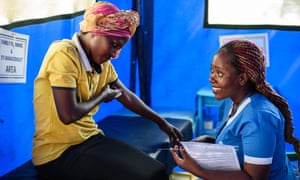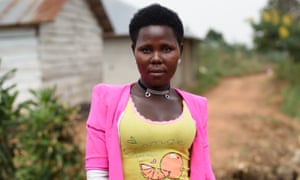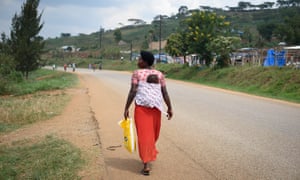A woman lies on her back, a one-year-old straddling her. One hand is over her eyes, the other held out. A nurse gently inserts a small white strip of contraceptive implant into her upper arm while her baby plays on her. They beckon me in. Privacy hardly seems to be an issue here.
I am in a tent in Rwibale, in the Kyenjojo district of Uganda. We have driven for about five hours from Kampala to get here. It is a place that Prosper Kigumire, who is showing me around, describes as “peri-rural”. It seems rural enough, a village – if that. I am with the mobile outreach team of Marie Stopes International. “I have four children so this does not hurt,” says Monica, the women who is getting the implant. “I have no husband.”
Eve Uwamahoro, the nurse, is pleased. “She will go out and tell the others that,” she says.
Outside the tent, women are gathering with their babies, many in their finery. They are giggling as intrauterine devices (IUDs) are passed around. Older kids are shooed away. Men walk past, not hostile exactly, but uncomprehending. Another nurse opens her “choice kit”, showing different methods of contraception. The women scrabble to get into a van bearing the slogan: “Parenting with Joy”.
There, they get counselling before going straight into the tent to receive their chosen method. Injections are popular, because husbands do not know about them while implants can be felt. I hear stories of IUDs being ripped out.
On average, women in Uganda have five children, but in rural areas they have many more. About 27% of women use a modern form of contraception.
Uganda is a very young country, with a third of the population under 19. A youthful population could transform this country, but not as long as babies are still making babies. There is a high rate of girls under 14 giving birth, some as young as 10.
Sex education is key, but the subject is contested. It might mean acknowledging that young people are having sex. In spite of the obvious evidence, neither the church, nor the government, nor certain aspects of Ugandan culture are keen to do so. Abstinence has been the key strategy. It is the one recommended by white American evangelicals who also roam the country telling women what to do with their bodies.

Dr Carole Sekempi, the director of Marie Stopes Uganda, tells me the message is “children by choice not chance”. A quarter of Ugandan women will have a child by 19. On average, they don’t start seeking contraception until they have at least two kids.
The dozen or so women I meet in the village all tell me about their husbands. They all sound like the same husband. “He does nothing. He will not take the children to school.” “He just drinks.” These women have built their own houses, but to be without a husband is to be outcast.
Some young girls are given away to older men whom they call “sugar daddies”. They drop out of school when pregnant but school is already difficult when they are hassled on the way there and when they are menstruating. Without school, options are limited and the cycle of poverty continues. Maternal malnutrition, complications surrounding birth and abortion are all present.
A girl of about 12 with a baby hovers around but does not stay. Maybe it’s too public. I chat to a surly girl in a shocking pink jacket, Anita Kobusingye. She is a peer-to-peer educator.
“I had a baby when I was 14. The father ran away,” she says. “I tried to search for him but his parents said he had died.” Anita is nonchalant and wants an independent life. Her friends fear getting pregnant more than contracting HIV. “When I go to their houses I always see the HIV medicine even though they say they don’t have it.”
There are various myths that stop her friends seeking contraception, she says. “In my community, they say you will swell in your uterus, you will get fat, you will not be able to have children ever. When I tell them it’s not that way they say: ‘How do you know, you are not a doctor?’”
The doctors I do meet are clear about how hard this is on rural women. But so is the Rev Moses Ssemugoma, an Anglican priest. His wife takes us to him as he has a broken leg. He is proud, he says, “to come out as a family planning champion”.
“As priests we do enough baptisms and enough funerals. We see the mothers die and the children die,” he says. He has educated his own bishop on these matters and he talks of timing and spacing of children as being part of the issue. “A baby a year? No, we have to advocate for women but male involvement is key. Men say to women: ‘You are my property.’ But no.”

He sees religion as a way to reach the grassroots of the nation. “We can get to the people, we can work with the government. Sixteen women are dying a day and everyone is still afraid to talk to their daughters.”
He uses his sermons to talk about this, as well as about sanitation. He understands that abstinence is preferable for young people, but he is pragmatic. “If a girl cannot abstain, at least give her information and access to family planning methods.” His wife serves us matooke as we talk to this thoughtful man. It is much harder for him to speak out in rural areas than in the city.
Indeed, Edward, our driver, tells us there are places where, if the Marie Stopes team turned up, they would be met by men with machetes.
Dr Peter Ddungu, from Marie Stopes, talks of the 30 outreach centres the organisation runs, and their clients. About 26% of them are in extreme poverty; 15% are under 20. When a mother dies, it is likely that her baby will die before the age of two. Such mothers may leave four or five children. Then he tells us about his vasectomy. The media could help. It’s a battle, though.
Getting to teenagers is vital in all this. At Naguru teenage centre I speak to young people who have just attended a talk on sexually transmitted diseases. None of them will tell me if they are sexually active. They are there for coughs and chest infections, and why should they tell me anyway? But here they can get the morning-after pill.

Christine is 18 and pregnant with her second child. She wants seven children, she says, because her husband does. When I ask her what she really wants her answer throws me completely. “A friend.”
Delivering services to adolescents requires privacy and this is difficult in all these settings. The issue is one of self-determination. Giving birth annually is neither good for women nor indeed for marriage, but the gap between how things should be and how they are is huge.
Sekempi is frustrated with what she calls boardroom discussions – “Policy ideas that say: ‘Don’t give contraception in a tent.’” She is worried that political instability could damage the services they do deliver. “Culture change is what we do.”
For her, male involvement is good, but actually “our girls must have autonomy. They must make their minds up. They must make decisions for themselves,” she says.
I think of Sadres Tukamushaba sitting on the floor of that tent. She was 32 with seven children and another three to look after. She had had enough. She no longer cared what her husband thought. “He doesn’t work, he doesn’t buy food, he doesn’t fix the roof. He just comes home to make me pregnant.”
She had walked a very long way to get there. She wanted simply not to be pregnant for a few years. I saw the exhaustion in her face and yet I saw the defiance too.
Without contraception there can be no autonomy for this woman or any woman. Sex education does not, as its critics say, lead to sex. Instead, it leads to women staying in education. It leads to a more prosperous future. That is a choice that Uganda could make.
Suzanne Moore
Published on 09-26-2018 in The Guardian